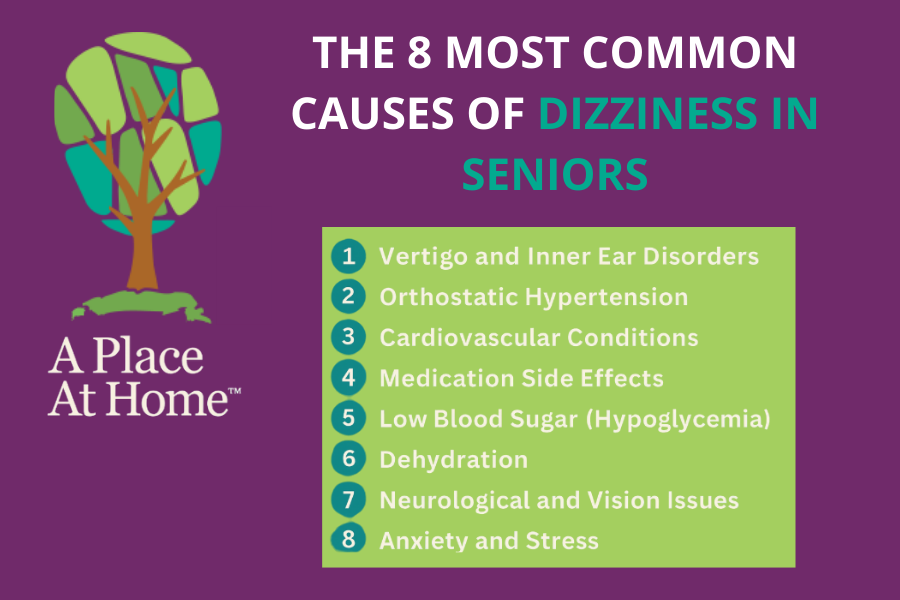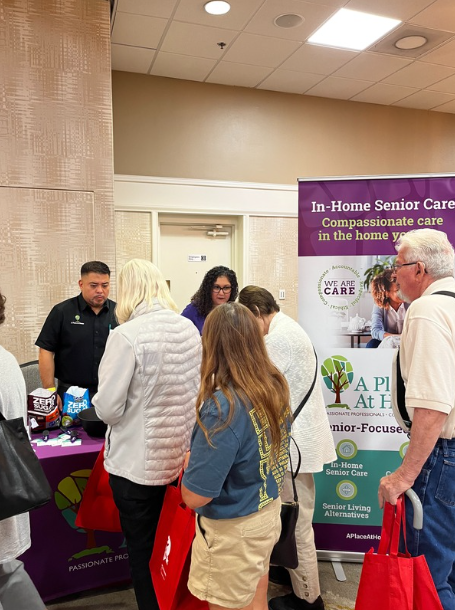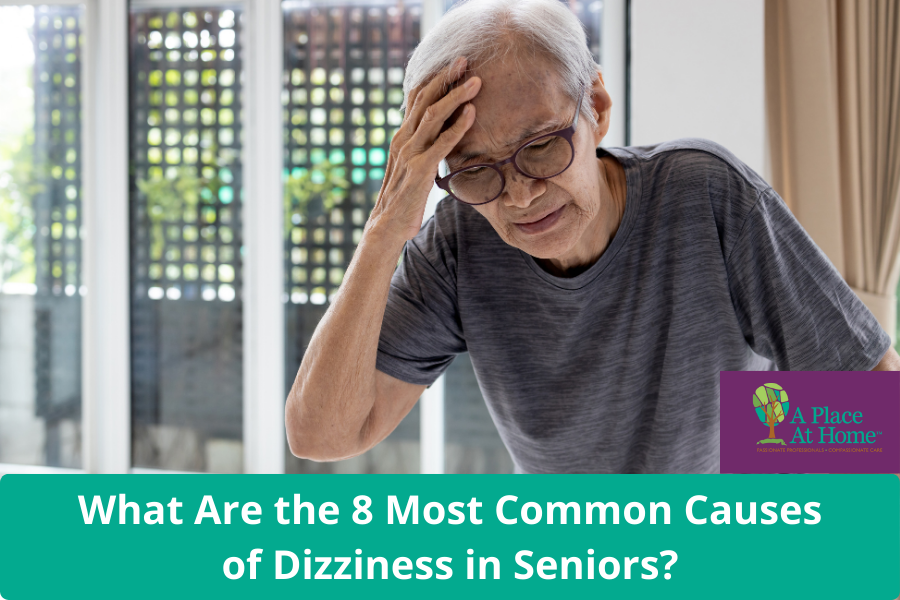Dizziness is one of the most common health complaints among older adults. It may present as lightheadedness, imbalance, or even vertigo, a spinning sensation that can feel sudden and overwhelming. While dizziness can seem like a minor inconvenience, it is actually a major concern for seniors because it increases the risk of falls, injuries, and a loss of independence.
According to the CDC, 1 in 4 adults over the age of 65 experiences a fall every year, and dizziness is one of the leading contributors. Understanding the most common causes of dizziness in seniors can help families and caregivers take proactive steps to protect health and maintain quality of life.
In this guide, we’ll explain the most common causes of dizziness in seniors, red flags to watch for, and how in-home senior care services can support safety and independence.
What is Dizziness in Older Adults?
Dizziness in seniors is often described as a feeling of lightheadedness, faintness, or imbalance. For some, it may also include vertigo, which gives the sensation that the surroundings are spinning. In many cases, dizziness in seniors is accompanied by weakness or unsteadiness when walking, making even simple daily activities more difficult.
This symptom should never be ignored. Even occasional dizzy spells can reduce mobility, cause seniors to avoid activity due to fear of falling, and point to underlying health concerns that require medical attention.
Why Should Dizziness in Seniors Be Taken Seriously?
For seniors, dizziness is more than just a passing discomfort. It has lasting effects on safety, health, and overall independence.
- Increased fall risk: Dizziness makes seniors unsteady, greatly increasing their chances of falling and sustaining injuries like hip fractures or head trauma.
- Loss of confidence and mobility: Frequent dizzy spells may cause seniors to limit physical activity, which can lead to muscle weakness, social isolation, and a decline in overall health.
- Indicator of medical issues: Because dizziness can stem from heart problems, blood pressure fluctuations, or neurological conditions, it should be viewed as a symptom that deserves thorough evaluation.
Read More: The Leading Causes of Dizziness in Seniors – Mayo Clinic
The 8 Most Common Causes of Dizziness in Seniors
Dizziness in seniors can stem from a variety of causes. Underlying health conditions, such as cardiovascular problems, often contribute to these episodes. In some cases, dizziness may be a side effect of new medications. Inner ear disorders are another common culprit, and sometimes multiple factors combine to trigger or worsen the sensation of dizziness.

1. Vertigo and Inner Ear Disorders
Inner ear problems are among the leading contributors to dizziness. Benign paroxysmal positional vertigo (BPPV) is particularly common in seniors. This occurs when calcium crystals shift into the inner ear canals, disrupting normal balance signals. Even simple movements like rolling over in bed or getting up too quickly can trigger sudden spinning sensations.
Another condition, Meniere’s disease, is linked to abnormal fluid levels in the inner ear. Seniors with this disorder may experience dizziness, hearing loss, ringing in the ears (tinnitus), and recurring episodes of imbalance that disrupt daily routines.
2. Orthostatic Hypertension
As people age, their bodies may struggle to regulate blood pressure effectively. Seniors with orthostatic hypotension experience a sudden drop in blood pressure when standing up too quickly, leading to dizziness, faintness, or even brief blackouts. This condition often occurs in those who take blood pressure medication or have dehydration issues.
3. Cardiovascular Conditions
Heart problems can also cause dizziness. Arrhythmias (irregular heartbeats) interfere with proper blood flow, limiting circulation to the brain and resulting in lightheadedness or fainting. Other cardiovascular concerns, such as narrowed arteries or low cardiac output, may also contribute to dizziness in older adults.
4. Medication Side Effects
Prescription medications are a frequent source of dizziness in seniors. Drugs that commonly cause this side effect include:
- Blood pressure medications
- Sedatives or sleep aids
- Antidepressants
- Anti-seizure medications
In many cases, dizziness lessens as the body adjusts, but ongoing symptoms should always be reviewed with a physician to rule out interactions or dosage issues.
5. Low Blood Sugar (Hypoglycemia)
Because the brain relies on glucose for energy, low blood sugar can trigger dizziness and lightheadedness. Seniors with diabetes are at particular risk, especially if meals are skipped, insulin doses are too high, or medications interfere with blood sugar balance.
6. Dehydration
Older adults are more prone to dehydration because the body’s thirst signals weaken with age. Even mild dehydration can lower blood pressure and reduce circulation, causing dizziness, weakness, and confusion.
7. Neurological and Vision Issues
Conditions such as Parkinson’s disease, neuropathy, or strokes may impair balance and contribute to dizziness. Poor vision also affects depth perception and stability, creating a higher risk of imbalance.
8. Anxiety and Stress
Mental health has a direct impact on physical symptoms. Seniors experiencing anxiety, depression, or panic disorders may report frequent dizziness, often linked to hyperventilation or stress responses.
How is Dizziness in Seniors Treated?
The treatment for dizziness depends entirely on its cause. For example, medication adjustments may reduce dizziness if it is a side effect of prescriptions. For seniors with vertigo, vestibular therapy or canalith repositioning maneuvers (like the Epley maneuver) can be highly effective. Physicians may also prescribe water pills, antihistamines, or migraine medications if needed.
At home, lifestyle adjustments play an important role. Seniors should stay hydrated, eat balanced meals, and avoid excessive caffeine, alcohol, and salt. Using mobility aids such as canes or walkers can reduce fall risk, while safety modifications like improved lighting and secured rugs make the home environment safer.
How Caregivers Support Seniors with Dizziness
Professional caregivers and family members are critical in helping seniors manage dizziness and its risks. At A Place At Home, caregivers provide:
- Fall risk assessments and home safety modifications
- Supervision and mobility assistance during daily activities
- Medication reminders and monitoring for side effects
- Nutrition and hydration support to reduce dizziness triggers
- Companionship and reassurance to help manage stress-related dizziness
These strategies not only reduce fall risk but also restore confidence and independence for seniors who may otherwise limit their activities due to fear of dizziness.

Elderly Home Care from A Place At Home – North Tucson
Dizziness can affect seniors in many different ways, but the greatest danger it poses is the increased risk of falls. At A Place At Home – North Tucson, we provide professional in-home senior care designed to keep older adults safe, comfortable, and independent in their own homes throughout North Tucson and Pima County.
Our caregivers offer personalized support that reduces fall risks, including thorough home safety checks, transfer assistance, and mobility support. We also help with light housekeeping, personal care, and daily routines to ensure seniors don’t take unnecessary risks that could lead to accidents. Beyond safety, our team provides companionship and peace of mind, helping seniors maintain their quality of life while families gain confidence knowing their loved ones are supported.
If your loved one in North Tucson or Pima County is experiencing dizziness or balance challenges, our compassionate caregivers are here to help. Contact A Place At Home – North Tucson today at (520) 783-7395 to schedule a free consultation and learn how we can support your family with trusted, professional home care services.
Frequently Asked Questions (FAQs) About Dizziness in Seniors
The top three causes of dizziness are inner ear problems (such as benign paroxysmal positional vertigo or Meniere’s disease), blood pressure changes (orthostatic hypotension), and medication side effects. These conditions disrupt balance or blood flow to the brain, making them the most common reasons seniors feel lightheaded or unsteady.
Deficiencies in vitamin B12 and vitamin D are strongly linked to balance problems. Low vitamin B12 can damage nerves that control coordination, while low vitamin D increases the risk of muscle weakness and falls. Seniors are especially vulnerable to these deficiencies, which may lead to dizziness or unsteadiness.
Red flags for dizziness in seniors include:
- Dizziness accompanied by chest pain, palpitations, or fainting
- Sudden dizziness with neurological symptoms like weakness, vision changes, or difficulty speaking
- Persistent or worsening dizziness despite treatment
These may signal serious heart, brain, or circulation problems and require immediate medical attention.
The difference is in the sensation:
- Dizziness is a general feeling of lightheadedness, imbalance, or faintness.
- Vertigo specifically refers to the false sense that you or your surroundings are spinning or moving.
In seniors, vertigo is usually caused by inner ear conditions, while dizziness may have multiple causes.
The best way to prevent dizziness-related falls in seniors is through a combined approach:
- Medical management: Review medications, treat inner ear conditions, and monitor blood pressure.
- Lifestyle habits: Stay hydrated, eat balanced meals, and avoid excess alcohol or salt.
- Home safety: Remove trip hazards, improve lighting, and install grab bars or railings.
- Caregiver support: Supervision and mobility assistance help seniors stay safe and confident at home.
 On October 22, 2025, our team from A Place At Home – North Tucson joined the News 4 Tucson Senior Fair at the DoubleTree Reid Park. As a family-owned and operated home care agency, we were excited to connect with the community and share how we help seniors age in place safely and comfortably.
On October 22, 2025, our team from A Place At Home – North Tucson joined the News 4 Tucson Senior Fair at the DoubleTree Reid Park. As a family-owned and operated home care agency, we were excited to connect with the community and share how we help seniors age in place safely and comfortably.






